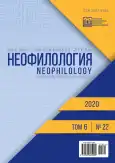Aktivnost' slovoproizvodstva i osobennosti struktury leksicheskikh edinits narodnogo pravoslaviya
- Authors: Dubrovina S.Y.1
-
Affiliations:
- Issue: Vol 6, No 22 (2020)
- Pages: 262-270
- Section: РУССКИЙ ЯЗЫК
- URL: https://journal-vniispk.ru/2587-6953/article/view/302761
- DOI: https://doi.org/10.20310/2587-6953-2020-6-22-262-270
- EDN: https://elibrary.ru/SREPBL
- ID: 302761
Cite item
Full Text
Abstract
The research is devoted to the analysis of the word formation peculiarities of the vocabulary expressing the idea of Christianity and the creed in the Russian language and its dialects, with priority attention to the dialect group of South Russian Tambov dialects. The aim of the study is to analyze the creative word-formation potential of the investigated lexicon, which defines a new approach: identifying the original derivational base in the historical projection, a variety of methods of derivation, description of motivational semantic relations. The word-formation potential and the structure of Christian vocabulary units are traced with priority attention to the dialect group of South Russian Tambov dialects. In the course of scientific development of the data the originality of dialect word-making is revealed, typical word-formation models in lexical and semantic groups are analyzed, the dominant influence of the historical old Slavic and Russian traditions and the interdependence of language and national mentality are evidently determined. Lexical realizations, the situational use of which sometimes presents unexpected contexts, demonstrates the self-value of studying the “religious” macro-field of vocabulary in the dialect “version”, and the dominant position of language in the formation of the national worldview. The facts prove the extreme importance of explication of the tradition of the creed in the main system and subsystems of the national Russian language. The basic empirical base is the “Explanatory Dictionary of the Living Great Russian Language” by V.I. Dal. The analyzed array of lexical units is formed from this source and compared with the data of other dialect dictionaries reflected in the bibliography. The reference point for the detection of units of Christian vocabulary by V.I. Dal was the dictionary litter “folk-church”.
About the authors
S. Yu. Dubrovina
Author for correspondence.
Email: slavia2009@yandex.ru
ORCID iD: 0000-0001-5561-8754
Doctor of Philology, Professor, Professor of Russian Language Department
33 Internatsionalnaya St., Tambov 392000, Russian FederationReferences
- Khaburgayev G.A. Staroslavyanskiy yazyk [Old Slavonic Language]. Moscow, Prosveshchenie Publ., 1986. 288 p. (In Russian).
- Dal V.I. Tolkovyy slovar’ zhivogo velikorusskogo yazyka: v 4 t. [Explanatory Dictionary of the Living Great Russian Language: in 4 vols.]. Moscow, “Progress”, “Univers” Publ. Group, 1994. (In Russian).
- Zhuravleva E.A. Pokhorony kukushki [Funeral of a cuckoo]. Zhivaya starina [Living Old Times], 1994, no. 4, pp. 32-33. (In Russian).
- Porokhova O.G. Polnoglasiye i nepolnoglasiye v russkom literaturnom yazyke i narodnykh govorakh [Full and Incomplete Agreement in the Russian Literary Language and Folk Dialects]. Leningrad, “Nauka” Publ. Lenin-grad Branch, 1988, 262 p. (In Russian).
- Vinogradov V.V. Slovoobrazovaniye v ego otnoshenii k grammatike i leksikologii (na materiale russkogo i rodstvennykh yazykov) [Word formation in its relation to grammar and lexicology (based on Russian and related languages)]. Voprosy teorii i istorii yazyka [Issues of Theory and History of Language]. Moscow, Academy of Sciences of the USSR Publ., 1952, pp. 99-152. (In Russian).
- Getsova O.G. (ed.). AOS – Arkhangel’skiy oblastnoy slovar’ [ARD – Archangelsk Regional Dictionary]. Mos-cow, Moscow University Publ., Issue 1 (A – Berezhok), 1980. (In Russian).
- Troshina N.N. 2001.02.041. Azarkh Y.S. Russkoye imennoye dialektnoye slovoobrazovaniye v lingvogeografi-cheskom aspekte. M.: Nauka, 2000. 178 s. Bibliogr.: s. 168-175 [2001.02.041. Azarkh Y.S. Russian nominal dialect word formation in the linguistic and geographical aspect. Moscow, Nauka Publ., 2000, 178 p. Bibliogr., pp. 168-175]. Sotsial’nyye i gumanitarnyye nauki. Otechestvennaya i zarubezhnaya literatura. Seriya 6: Yazykoznaniye. Referativnyy zhurnal [Social and Humanitarian Sciences. Domestic and Foreign Literature. Series 6: Language Studies. Abstract Journal], 2001, no. 2, pp. 179-185. (In Russian).
- Tolstoy N.I. Alliluyya [Hallelujah]. Slavyanskiye drevnosti: etnolingvisticheskiy slovar’ [Slavic Antiquities: Ethnolinguistic Dictionary]. Moscow, International Relations Publ., 1995, vol. 1, pp. 100-102. (In Russian).
- Podyukov I.A. Slovar’ russkikh govorov Yuzhnogo Prikam’ya [Dictionary of Russian dialects of South Pri-kamye]. Perm, Perm State Pedagogical University, 2010, Issue 1, 456 p. (In Russian).
- Smorgunova E. Slova «grekh» i «pokayaniye» v russkikh pamyatnikakh XV–XVII vekov [The words “sin” and “repentance” in Russian monuments of the 15th–17th centuries]. Kontsept grekha v slavyanskoy i evreyskoy kul’turnoy traditsii. Akademicheskaya seriya [The Concept of Sin in the Slavic and Jewish Cultural Tradition]. Moscow, 2000, Issue 5, pp. 44-71. (In Russian).
- Vendina T.I. Russkaya yazykovaya kartina mira skvoz’ prizmu slovoobrazovaniya: makrokosm [Russian Lan-guage Picture of the World Through the Prism of Word Formation: Macrocosm]. Moscow, Indrik Publ., 1998, 240 p. (In Russian).
Supplementary files









